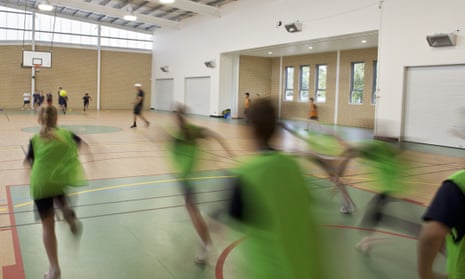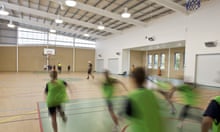Sport England is launching a £13.5m scheme to train 17,000 teachers in delivering PE and sport in school, after research found that almost 20% of secondary students hated PE lessons.
With more than a quarter of the nation’s adults “inactive”, according to the Active Lives survey released in March, Sport England wants to ensure students are leaving secondary education with an active lifestyle.
Jennie Price, the chief executive of Sport England, said: “While some youngsters have a great experience of PE and sport at school, others don’t, and our research shows that can put them off being active for life. Lots of people have bad memories of being picked last for a team or just feeling really uncomfortable in PE lessons. This programme is designed to stop that happening.”
The scheme will run through the national network of teaching school alliances, training teachers in new activities from zumba to volleyball and encouraging school leaders to value PE.
Last year the government doubled the funding for PE in primary schools to £320m a year, and 1 million primary school children are now taking part in the Daily Mile running programme, but secondary schools have been without any financial investment or national schemes in the subject for the last decade.
A third of pupils leaving primary school are overweight or obese, making it more difficult for secondary school PE teachers to ensure their lessons are inclusive.
Meanwhile, schools are under greater pressure than ever to perform in academic subjects, and a Youth Sport Trust survey found that 38% of teachers said PE time had been cut for 14- to 16-year-olds in the past five years.
The former Olympic sprinter Darren Campbell, whose company works in schools, said there was a link between sport and mental health. “Competitive sport is being taken away and it’s becoming all about taking part,” he said. “Life is competitive, just getting a job is competitive. Sport is life lessons, learning how to win and learning how to deal with defeat. We’re failing to prepare young people for disappointment.”
Another Olympian, Denise Lewis, welcomed the focus on how teachers delivered PE lessons but expressed concern about what she saw while visiting schools.
“The lack of coordination in young people is alarming. I’ve been to schools where children aged nine and 10 just can’t skip,” she said. “It’s great they’re addressing secondary school PE but I still believe that by the time children are in year 6, if they are fitter and more coordinated, they will be more readily keen to participate in exercise at secondary school.”
Lewis also highlighted an issue facing teenage girls. “Most girls I see don’t have the correct fitting bras. They’re conscious of their shape while they’re participating in exercise, so they don’t commit fully. They’re participating with the handbrake on because they’re so self-conscious about their body.”
She said teachers needed to consider innovative and sensitive ways to support parents in providing appropriate kit.
Ross Myhill, the head of PE at Thomas Gainsborough school in Suffolk, one of 40 taking part in a pilot scheme, described the impact it was having, from training teachers to deliver activities such as yoga and handball to making the most of existing facilities through additional after-school clubs.
The school is running inclusive competitions for lower-ability students, such as a “Highland Games-style” sports day with welly throwing and tug of war. “These are students who have never represented the school [in sport] in their whole lives. They get to experience that same sense of pride, and competition,” Myhill said.
“I’ve been teaching for 15 years and I don’t think there’s been such a hands-on scheme before. You have up to £20k to upskill staff to give secondary school students more opportunities and get them active.
“We’ve got a rock climbing wall in school but – and it’s horrible to say it – we don’t have enough money in the school to be able to put people on a rock climbing course to deliver the lessons.”
With the new funding, Myhill hopes to be able to offer lunchtime and after-school sessions, as well as opening up the facility to the local community.








